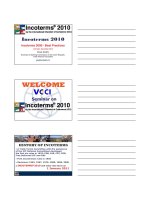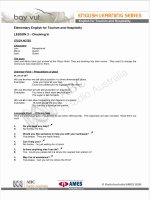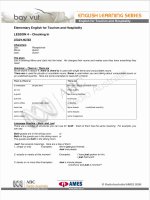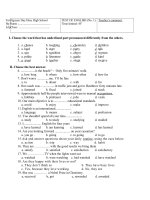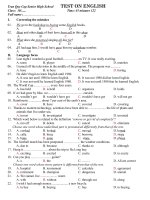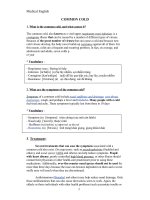ENGLISH 10-PART 3(CKCC)
Bạn đang xem bản rút gọn của tài liệu. Xem và tải ngay bản đầy đủ của tài liệu tại đây (525.35 KB, 61 trang )
1
Unit
10
CONSER
VATION
A.
READING
Before you
r
ead
Look at the pictures, and then answer the questions.
1. Have you ever visited a zoo or a forest?
2. What animals are you interested in? Why?
3. Do we need to protect animals and forests?
While you
r
ead
Read the paragraphs, and then do the tasks that follow.
A. The loss of forest is destroying the earth's plant and animal variety.
Scientists say about 5,000 species of plants and animals are eliminated
each year. This is especially worrying as many of those plants and
animals could be used as medicines against cancer, AIDS, heart
disease and many other sicknesses. We may never know the true cost
of this destruction.
B. Man and most animals need a constant supply of water to live.
Farmers need water for their crops. Hydroelectric dams hold back
needed water and provide power for homes and industries.
Trees, grasses, and other plant life play an important part in the natural
circulation of water, and thus help conserve it. Without plants, most
water would run off as soon as it falls, taking away valuable soil.
Rapid run-off would cause frequent floods and leave little water
during dry seasons.
C. These days it is impossible to open a newspaper without reading
about the damage we are doing to the environment. The earth is being
threatened and the future looks bad. What can each of us do?
We cannot clean up our polluted rivers and seas overnight. Nor can we
stop the disappearance of plants and animals. But we can stop
worsening the problem while scientists search for answers, and laws
are passed in nature's defence.
Task 1. Match the word in A with a suitable definition in
B.
A B
1. eliminate
2. circulation
3. run-off
4. hydroelectric
a. the movement of something around a
closed system
b. concerning or producing electricity by
the power of falling water
c. remove or get rid of completely
d. liquid which flows off or from
(something)
Task 2. Decide whether the following statements are true (T) or false (F).
T
F
1. Each year about fifty hundred species of plants
and animals are eliminated.
2. Many kinds of plants could be used to treat various
dangerous diseases.
3. Water can be held on land by vegetation.
4. Man is constantly doing harm to the environment.
5. Plants may cause floods and erosion.
6. We can do nothing to save the earth.
Task 3. Choose the most suitable main idea for each paragraph.
1. We cannot live without water.
2. Let's do something to save the earth.
3. Forests give us a lot of valuable things.
4. Vegetation can help conserve
water.
After you
r
ead
Answer the following questions.
1. What is the consequence of losing forest?
2. How important is water in our life?
3. What should we do for the future of our planet?
B. SPEAKING
Task 1. Work in pairs. Read the paragraphs and answer the
questions.
1. For what purpose are zoos of the new kind opened?
2. What are their main features?
A. Zoos are very sensitive about their image nowadays. They don't
want to be seen as places where animals are imprisoned against their
will. Instead, they want to be seen as places where endangered species
can develop. They want to reconstruct the animals' natural
environment. So there appears a new kind of zoo.
B. Howletts Zoo in Kent is owned by John
Aspinall, who is famous for his programme of
breeding endangered animals and
reintroducing them into the wild. The zoo has
the largest gorillas in the world and its policy
is to provide as natural an environment as
possible for the animals. At times, this can
be risky, and some keepers have been injured
and one has been killed.
Task 2. Put a tick (✓) in the right box to show your agreement
or disagreement. Then share your ideas with a partner.
In the zoo of
the new kind
animals may have better food.
animals may suffer from dangerous diseases.
animals may do what they want to.
animals may develop.
animals may feel happier.
Yes No
Task 3. Work in groups. Discuss the advantages and disadvantages
of zoos of the new kind. Use the cues below:
− the conditions the animals are in
− the money spent on reconstructions of the animals' natural
environment
− the animals that people can visit
− the dangers that keepers may have
Task 4. Make group reports, sharing your views with the rest of
the class.
C. LISTENING
Before you
listen
● Work in pairs. Talk about what may cause a forest fire.
● Listen and repeat.
forest campfire valuable
forester destroy awful
While you
listen
Task 1. Listen and number the events in the order you hear.
A campfire near a heap of leaves may easily cause a forest fire.
In late summer, fire is the greatest danger to forests, and sometimes
people are not allowed to go into them.
All of us must care for our great forests and save them from fire.
It's an unpleasant thing to see a great forest fire.
A forest fire destroys valuable wood, wildlife and good soil.
Task 2. Listen again, and decide whether the following statements are
true (T) or false (F).
T
F
1. Once a fire has started, it takes time to spread.
2. In late autumn, forests may easily catch fire.
3. Campers must use earth to put out their campfires completely.
4. A forest fire may make life more difficult for all of us.
5. It is the duty of every forester to take care not
to start a forest fire.
Task 3. Listen again, and tick (✓) the sentences you hear.
1. a. Have you ever seen a forest destroyed by fire?
b. Have you ever seen a forest fire?
2. a. A great forest fire spreads quickly.
b. A great forest fire is an awful thing to see.
3. a. They are very dry then.
b. Woods and forests are really dry then.
After you
listen
Work in pairs. Say how a forest fire may start and what every
camper ought to remember.
D.
WRITING
A letter of
invitation
Task 1. Write out the sentences by matching the first half in A with
the most suitable half in B.
A B
1. Let's
2. Why don't you
3. Would you like
4. Do you feel like
5. Can you
6. How about
7. Shall we
8. Are you free
a. to have a cold drink?
b. to play table tennis now?
c. try the cake I have just made.
d. going to the cinema tonight, Ba?
e. have some chicken soup first?
f. join us in this trip?
g. taking a walk for a while?
h. sing us a Vietnamese song?
Task 2. Fill each blank in these invitation letters with a suitable
expression provided in Task 1.
1.
Lien,
There's
a
disco
at
my school from 8:00 to 10:00 on
Sunday
night.
to join
us?
Give
me
a call.
Chi
2.
Dear Mike,
to go to the
football match tomorrow
afternoon?
I've just got two free
tickets.
going
to
a
club
afterwards?
David
3.
Susan,
We
have
just
got
back
from
London.
come to
dinner
on
Saturday? Jeremy and Lora will
be
there,
too.
spend some
time together?
Daisy
and Tony
Task 3. Nam invites his friend
−
Lam, who is now living in a
different town, to spend a weekend with him. Help Nam to write a
letter, using the cues below.
Dear Lam,
we / not meet / since / you /
move.
I
/ miss /
a
lot.
we / both /
have
/ some days-off /
between
/ two terms /
soon.
if / not
make
/
other plans
/ why / not spend /
weekend
/
together?
feel / like / visit / forest /
near
/ my
grandparents'
/
again?
look /
quite different
/ now /
because
/ very
many young
trees /
plant
/ the
Tree-Planting
Festivals.
do come / if /
find
/ possible /
and
/
I
/
make
/
all
/
preparations./
give / love /
your
parents.
Your
friend,
Nam
E. LANGUAGE F
OCUS
●
Pronunciation:
/ b /
−
/ p /
●
Grammar:
The passive voice
Pr
onunciation
● Listen and repeat.
/ b / / p /
bee cab pea cap
ban bright pan provide
bad back Paul power
● Practise these sentences.
1. Pat buys Bill a big pad of paper.
2. A black bee is picking some pollen.
3. Put the blouses in the paper bags.
4. Paul borrowed a book about puppies from the library.
5. The beautiful carpet is my brother's present.
6. Is this picture painted on the pupils' caps?
Grammar
The passive voice
− Scientists say about 5,000 species of plants and animals
are
eliminated each
year
.
−
The earth is being threatened and the future looks
bad
.
Exercise 1. Choose the right form of the verbs in brackets.
1. The children (reported/were reported) to be homeless.
2. Trees (grow/are grown) well in this soil.
3. Can English (be spoken/speak) at the club?
4. I (don't invite/am not invited) to parties very often.
5. Many new roads (are being built/are building) in this city.
Exercise 2. Put the verbs in brackets in the correct form.
1. When they (come), the meeting (start). They (be) ten minutes late.
2. He (stand) in front of a large audience. He (photograph) by many
journalists now.
3. The students (tell) about the changes of their timetable yet?
4. At that time the table (lay) and I (decide) not to come in.
5. Where these young coconut trees (plant)?
Exercise 3. Fill each blank with the correct form of a verb in the box.
arrive be clean meet take
make organize put prepare serve
− How was the holiday?
− Oh, it was fantastic. Everything (1) so well. As soon as we
(2) at the airport, we (3) and (4) to the
hotel. All the rooms (5) well and fresh flowers (6)
on the table.
− Oh, how lovely! And what about the food?
− It (7)
excellent. They freshly (8) it all in the hotel
and they even (9) the bread in the hotel kitchen. The bread rolls
(10) hot every morning for breakfast.
ya
Unit
11
NATIONAL PARKS
A.
READING
Before you
r
ead
Work with a partner. Answer the following questions.
1. Have you ever been to a national park?
2. Can you name some of the national parks in Vietnam and in the
world?
3. What trees and animals can you see in a national park?
While you
r
ead
Read the passages, and then do the tasks that follow.
Cuc Phuong National Park, V
ietnam
Cuc Phuong National Park is located 160 kilometres south west of
Hanoi. It is the first of Vietnam's nine national parks to be established,
and it contains over 200 square kilometres of rainforest. Tourists go
there to study butterflies, visit caves, hike mountains and look at the
1,000-year-old tree. The best time to visit the park is during the dry
season, from October to April, when the rainy season is over.
Nairobi National Park,
Kenya
Nairobi National Park is Kenya's smallest park, but you may be
surprised at the large variety of animals that live there. Visitors,
especially children, can go there to learn how to recognise the
different species of animals and plants. They also learn about the
habits of animals and how one species is dependent upon another for
survival. An interesting feature of this park is the Orphanage, where
lots of orphaned or abandoned animals are taken care of.
Everglades National Park, USA
Everglades National Park is a sub-tropical wilderness in the
southeastern United States. This national park is special because it has
plants and animals from both tropical and temperate zones. Due to an
increase in population and the use of nearby land for farming, there
are toxic levels of chemicals in the water. This contamination has
threatened the park and many of the animals in it.
Task 1. Find the word in the passages that best suits each of the
following definitions.
1. establish to start an organization that is intended to continue for a
long time
2.
3.
4.
5.
6.
to have something inside
a group/groups of animals or plants a
state of continuing to live or exist
related to an area near a tropical area
a state of being polluted
Task 2. Answer the following questions.
1. What is the area of the rainforest in Cuc Phuong National Park?
2. Why would November be a suitable time to visit this park?
3. What can people learn in Nairobi National Park?
4. What kinds of animals are taken care of in the Orphanage?
5. Why is Everglades National Park endangered?
6. What do you think will happen to Everglades National Park if
more chemicals are released into the water?
After you
r
ead
Discuss in groups. Which of the three national parks would you like
to visit most? Why?
B. SPEAKING
Task 1. Last week Nga's class went on an excursion to Huong Pagoda.
Unfortunately, the excursion turned out to be a disaster. Most of the
things they did went wrong. Combine the things in column A with the
corresponding consequences in column B and read out the sentences.
A B
1. They went by coach.
2. They did not bring enough food
and drinks.
3. Some had food poisoning.
4. They had no raincoats.
5. Some left their luggage on the
coach when they arrived.
6. Some were not careful when
walking in Huong Pagoda.
7. Some threw waste in the forest.
8. They stayed there only one day.
a. They got a fine.
b. They had no clothes or money
with them.
c. They got lost.
d. They couldn't visit all the
pagodas. e. They had to spend a lot
of
money eating in expensive
restaurants.
f. Most of them got carsick.
g. They got wet and some got a
cold. h. They didn't enjoy their
Example:
They went to Huong Pagoda by coach and most of them got
carsick.
Task 2. Most of the students in Nga's class are not happy with their
excursion to Huong Pagoda. Now they are talking about what they
wish they had or hadn't done.
Examples:
If we hadn't gone by coach, we wouldn't have got
carsick.
If we had gone by bike, we wouldn't have got
carsick.
Continue their talk, using the ideas in Task 1.
Task 3. You are Nga. Work with a partner. Tell her/him about
your class’ excursion to Huong Pagoda and express your regrets about
what you did or did not do during the excursion.
C. LISTENING
Before you
listen
● Work in groups. Ask and answer the following
questions.
1. Where is Cuc Phuong National Park?
2. What is the area of the rainforest in Cuc Phuong National Park?
3. When is the best time to visit Cuc Phuong National Park?
4. What can be seen in Cuc Phuong National Park?
● Listen and repeat.
threatened and endangered species
ethnic minority
flora
fauna
attack
enemy
While you
listen
Task 1. Listen and fill in the missing information.
1. Cuc Phuong National Park was officially opened in .
2. Cuc Phuong is located Hanoi.
3. In 2002, nearly visited Cuc Phuong.
4. There are different species of flora and
species of fauna.
5. Nguyen Hue's army was stationed in Quen Voi before it made its
on Thang Long.
Task 2. Listen again and answer the following questions.
1. How many provinces does Cuc Phuong National Park belong to?
2. How far is it from Hanoi to Cuc Phuong?
3. What do many people come to Cuc Phuong for?
4. When did Nguyen Hue defeat the Qing invaders?
5. What do the Muong ethnic minority in Cuc Phuong live mainly on?
After you
listen
Work in groups. Talk about the
special features of Cuc Phuong
National Park.
D.
WRITING
Write a letter of acceptance or
r
efusal
Task 1. Below are some common ways of accepting or refusing an
invitation. Read them, and fill each blank of the notes with a suitable
expression.
Ways of
accepting
Ways of
r
efusing
Yes, I'd like / love to.
Yes, that's a great idea.
Yes, I'd be delighted to.
I'm afraid I can't come because
I'd love to, but
I'm sorry I can't (come) because
1.
Dear
Chi,
Something
is wrong with my phone, so
I
am
leaving
you this
note.
Thanks for your
invitation.
!
How about
meeting
at
the school gate
at 8:30?
Lien
2.
Dear David,
Thanks
for
your
note.
my
father has
been
ill
since
yesterday and
I
have
to look
after him.
Let's go
another time.
Mike
3.
Dear Daisy and Tony,
Thanks
very
much
for
your invitation
to
dinner.
Of
course,
.
I'm
sure we
will have a
very good
time
together.
Susan
Task 2. Rearrange the following sentences to make a letter accepting
an invitation to spend a weekend in the country.
Dear Nam,
a.
You know how
much
I
love
spending a weekend in
the
country after a long and hard term.
b. Give my best
regards
to
your parents and
hope
to see you
soon.
c.
I
would really
like to
come.
d.
Thank
you for
your
letter.
e. It’s
lovely
to
hear that
you
are going
to
spend
the next
weekend in
the
country.
f.
I
will catch
the
usual train
on
Friday
evening.
Love,
Lam
Task 3. One of your friends has invited you to go for a picnic to
Cuc Phuong National Park next weekend. Write a reply letter
accepting or declining his/her invitation.
E. LANGUAGE F
OCUS
●
Pronunciation:
/
t
/
−
/ d /
●
Grammar: Conditional
sentence type 3
Pr
onunciation
● Listen and repeat.
/t/ /d/
topic toxic difficulty documentary
contain contamination invader dependent
plant different spend depend
worked hoped lived played
● Practise these sentences.
1. It's next to the restaurant on the third floor.
2. They're on the next counter on your left, dear.
3. It's exactly twenty-two minutes to ten.
4. They stayed at home and played cards with the children.
5. Sidney and I listened to the radio and studied.
6. Donald and I had a bad cold, so we decided to stay at home.
Grammar
and
vocabulary
Exercise 1. Complete the following sentences, using the correct form
of the verbs in brackets.
Example:
I would have sent you a postcard if I (have) your address.
I would have sent you a postcard if I had had your
addr
ess.
1. If I (know) that you were ill last week, I would have gone
to see you.
2. I would have bought a new bicycle if I (have) enough money.
3. If I had had a motorbike, I (go) home immediately.
4. If he had worked hard, he (pass) his examination.
5. We (enjoy) the party better if it had not been so long.
6. He wouldn't have begun to learn Russian if he (know) the
difficulties.
7. If the rain (stop), I would have gone for a walk.
8. If you (call) him, he would have come.
Exercise 2. Write a sentence with if for each situation.
Example:
I wasn't hungry, so I didn't eat anything.
If I had
.
If I had been hungry, I would have eaten something.
1. The accidents happened because the driver in front stopped so
suddenly.
If the driver in front hadn't
.
2. I didn't know that Lam had to get up early, so I didn't wake him.
If I had known
.
3. I was able to buy the car only because Hoa lent me the money.
If Hoa hadn't
.
4. Mary was not injured in the crash because she was wearing a seat belt.
If Mary hadn't
.
5. You did not have breakfast − that is why you are hungry now.
If you had
.
6. I did not get a taxi because I did not have any money on me.
If I had
.
Exercise 3. Use the given information to make conditional sentences
with if.
Example:
A bull was blocking the road, so we didn't arrive on time.
If a bull hadn't been blocking the road, we would have arrived on
time.
1. I wasn't working at the restaurant last night. I didn't wait on your
table.
.
2. They weren't paying attention, so they didn't see the sign marking
their exit from the highway.
.
3. Carol didn't answer the phone because she was studying.
.
4. The sun was shining, so we went to the beach yesterday.
.
5. The music was playing loudly at the restaurant, so I didn't hear
everything Mr. Lee said during the dinner.
.
TEST YOURSELF D
I. Listening (2.5
points)
Listen to the passage and answer the questions.
1. Why do people go to a national park?
2. When did Yellowstone become a national park?
3. Is Yellowstone the smallest national park in the world?
4. How many geysers does Yellowstone have?
5. What mustn't visitors do in Yellowstone?
II. Reading (2.5
points)
Read the following passage, and then do the exercises that follow.
Conservation is the protection and wise management of the
environment. People practise conservation so that the environment can
preserve their needs and the needs of all other living things. Without
conservation, all the resources necessary for life − air, animals,
energy, minerals, plants, soil, and water − would be damaged, wasted,
or destroyed.
Conservation also includes a concern for the quality of the
environment, so that people can enjoy living in it. It means keeping
it healthy and safe − and an interesting place to live in. A healthy
environment includes clean streets and highways, with open spaces
in cities for parks and playgrounds. Ideal surroundings mean
landscapes free of junk and litter. They include regions of wilderness
where animals and plants can be protected from the destructive
influence of human beings.
